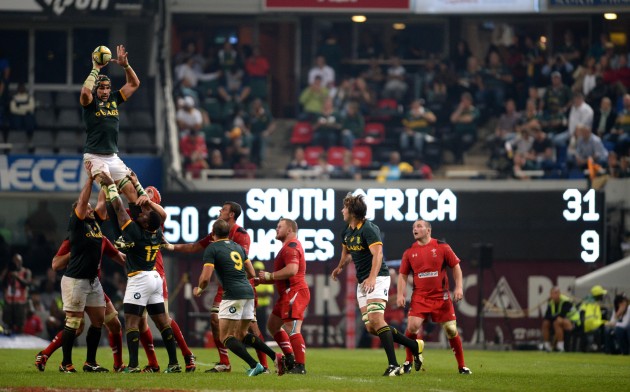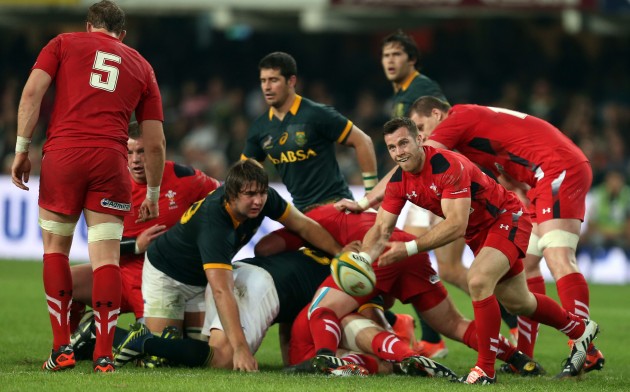Wales were comprehensively outplayed in Durban leading to Warren Gatland to state that an improved performance in Nelspruit was a necessity
The gap is widening
This week Warren Gatland will feel as though he has gone from O.B.E to OMG. There was a stage when the performance gap between Wales and the big three was closing. Even though Wales weren’t necessarily winning games against New Zealand, South Africa and Australia the losing margins were getting smaller and the key performance indicators were largely equal. This was not the case against the Springboks. Despite a more resolute showing in the second half Wales were blown away by 38-16. Pre-game, the major concern was the enormous back row of Francois Louw, Willem Alberts and Duane Vermeulen – but in reality the threat came from all areas.
Wales spent large swathes of the game defending against a deft kicking game, which frequently undid Wales’ overzealous blitz defence. The sublime Willi Le Roux tormented the Welsh backline and Bryan Habana had one of his finest outings for the Springboks in many a season. But by far the most worrying aspect of the Welsh performance was the possession and territory stats. Wales had just 43% of the possession and 37% of the territory overall. In the first-half Wales secured an alarming 31% possession and 24% territory. You may think that the obvious explanation for these issues is the overwhelming size of the Springbok pack, but it isn’t. The Boks pack weighed in at just 9kg heavier than Wales (Wales 922kg, South Africa 931kg). The Welsh pack is big and heavy. In fact, the Welsh pack was 24 kg heavier than either the All Blacks or England packs that ran out on Saturday morning. Deeply concerning.
Rare mistake from Jamie Roberts
Jamie Roberts‘ mid-air hit on Willie Le Roux was as unusual as it was costly. Roberts’ ten minutes in the bin cost Wales 14 points – and a net loss of eleven points. It was a rare mistake from the Welsh centre. He doesn’t suffer from erratic rushes of blood to the head, he’s a calm and calculated man – in fact he could probably tell you the exact chemical composition of the blood that rushed to his head when he swept Le Roux mid-flight. The result was that Wales conceded 14 points in a game where they were forced to score in threes whilst the Springbok’s scoreboard was rolling over like a stopwatch. Damaging.
Wales are behind the ‘kicking’ curve
Five years ago a strident kicking strategy was necessary. The rules at the breakdown meant that it was almost easier to play without the ball than it was with. That is not the case anymore. You just have to look at how the Springboks utilised their back three and in particular the peerless Willie Le Roux. The Springboks no longer automatically return the rugby ball like they’re playing ‘Bat’n Ball’ on an Atari. Le Roux only kicked the ball four times against Wales – he ran it 12 times and passed it 13 times. Bryan Habana also kicked the ball just once, yet running it ten times.
This is not a phenomenon unique to the Springboks. This trend is also evident with the All Blacks and the Wallabies – both Ben Smith and Israel Folau often assess their options before kicking. Ben Smith only kicked the ball three times against England – running 19 times and opting to pass on nine occasions. Even Israel Folau who was operating under a very tight kicking strategy, from Ewan McKenzie, against France kicked the ball just six times – completing 13 runs and seven passes. This isn’t to say that the Southern Hemisphere teams don’t kick the ball – of course they do. But the manner in which they deal with possession that is kicked their way is evolving.
Defence is no longer enough
Wales always pride themselves on their defence and they have every right to. Under Shaun Edwards their tackle completion rarely drops below 90% and most often hovers around an impeccable 92%. This was the case against the Springboks. Wales completed 155 tackles, missing just 15, a completion of 92% – that’s the highest completion of all of the elite nations that competed this weekend. However, defence is not enough at test level. Defence is a given at test level.
If anything, against the Springboks, the Welsh defence line was too aggressive. The Springboks coaches had clearly done their homework on Wales’ defensive patterns, opting to dink chips over the blitz defence and uncovering the acres of space that lie behind or on the outside of the blitz. It was a very effective tactic and caused Wales no end of problems. Whilst Wales and Shaun Edwards should rightly be proud of what they achieve in defence – what the squad achieves in attack is of utmost concern.
Gareth Davies continues to impress
As you would expect in a 38-16 defeat impressive individual performances were hard to come by. Alun-Wyn Jones and Dan Biggar efforts together with Alex Cuthbert’s blistering individual try being the highlights. However, one player who continues to make a difference, as he has done all year for the Scarlets, is Gareth Davies.
Davies clearly has the skillset to perform at this level. He has a peppy passing game, solid defence and runs ‘arcs’ that consistently ask questions of the opposition’s narrow defensive channels. Davies was only on the field for 25 minutes but he made one clean line break and beat three defenders – impressive numbers for a mere cameo. If Warren Gatland is to make changes for the second test – Davies, with merit, deserves to be one of them.
https://www.youtube.com/watch?v=4N35qOwkPRA









